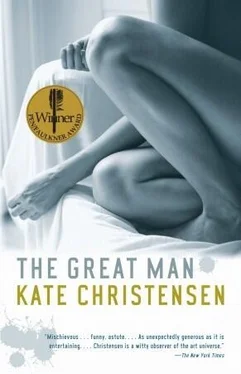“That’s right,” he said briefly.
“And I hope you stay here forever,” said Natalie.
“Well, if I do, I promise I’ll get my own place.”
“We have plenty of room,” said Natalie.
Seth gave his sister another complicated look.
Natalie smiled joyfully at the cozy little trio she’d created, then sidestepped away to greet a newly arrived couple, kisses on all cheeks.
“Are you enjoying your visit to New York?” Maxine asked Seth, throwing the question into the sudden cold pool of silence like a depth-sounding pebble. As senior member of this enforced huddle, it was the least she could do.
“He’s actually moving here,” the redheaded Charles said, looking at Seth, “but he can’t admit it yet.”
“So you’re a painter,” said Seth to Maxine, ignoring what Charles had said.
“I am a painter,” she replied, as if she were saying, “I’m nothing but a pawn in this lovers’ spat and I wish I were home right now.”
“So is Charles,” said Seth cruelly.
“Who are some of the artists you admire?” Maxine asked; the old trick of sussing out the competition.
“I love your work,” said Charles with endearing alacrity. “De Kooning, Kandinsky, Kline, and Rothko are great influences also.”
“Anyone more contemporary?”
Charles looked at Maxine with sidelong hesitation, as if he were trying to gauge her own opinions before he answered in order to avoid offending her. “A lot of what I see these days, I can’t relate to,” he said. “I guess that makes me an anachronism. That seems to be the general opinion anyway; I’m still trying to get a gallery to show my work.” His face was mottled now.
“Getting a gallery solves very little,” said Maxine. “It only creates more headaches and terrors than you had before.”
“I’ll take them,” said Charles. She saw the force of ambition undergirding his quip like a massive glacier slow-moving in the sunlight.
“I invited him here to meet my brother-in-law,” said Seth, “but he’s too shy to let me introduce him.”
“Not yet,” said Charles. “I just got here.”
“You mean,” said Seth, “you’re not drunk enough yet.”
“I’ll introduce you,” Maxine told Charles. “I’ll say you’re my protégé. That carries more weight with him than a family connection.”
“You’ve never seen my work,” said Charles.
“Don’t shoot yourself in the foot,” Maxine snapped. “Come with me. Play along.”
She turned and stumped toward the kitchen without looking to see whether he was following. If he wasn’t, that was his mistake.
“He’s not my boyfriend,” she heard Charles mutter behind her. “Just a friend.”
“Glad to hear it,” she shot back. “What’s your last name?”
“Emerson,” he said. “Thank you so much for doing this.”
“Oh, painters are like a big Irish family in the potato famine: There’s never enough of anything to go around — collectors, galleries, grants, prizes…. But I’m so old now, I’ve got nothing to lose.”
Michael Rubinstein was standing by his own refrigerator, deep in conversation with a very young woman with cocoa-colored skin who was wearing a slinky vintage cocktail dress and a lot of berry-colored lipstick. In the time it took to cross over to them, Maxine deduced that the girl worked at Michael’s gallery, he wasn’t sleeping with her, and they were flirting around the fact that he could if he wanted to.
“Michael,” said Maxine, interrupting them without apology, “I’d like you to meet Charles Emerson. He’s a painter. You should take a look at his work.”
“Hello, hello,” said Michael to both Maxine and Charles, kissing Maxine on the cheek, shaking Charles’s hand. He was a short, broad-chested man in early middle age, with a lionlike head. “Sorry, your name is?”
“Charles Emerson,” said Charles. He cleared his throat. “It’s a pleasure to meet you.”
“You’ll remember his name, Liza,” said Michael to the girl. “Maxine, of course, you know.”
Maxine the person, of course, Liza didn’t know, but the name at least she recognized. “Nice to see you,” she said, and shook Maxine’s proffered hand. She had an English accent. “Hi, Charles,” she added brusquely, not bothering to meet his eye.
Liza was, Maxine was certain, a painter herself, for whom every day as a minion at the Rubinstein Gallery was like working as a scullery maid in a house she hoped to own someday. To her, Charles was nothing but competition. Maxine was certain Liza would have decided to forget his name and everything else about him by the time his slides arrived, or his CD, or whatever they sent around now.
Maxine took a swig of whiskey, swallowed, and said to Charles, as a veiled threat to Liza, “Listen, Charles, I’ll call you in a week to make sure you’ve sent your work to Michael.”
“Thank you,” said Charles with a tentative disbelief that touched her. It was so easy to help someone, so nice when they showed proper gratitude. Good, now she was free to die: she’d passed the torch, however tenuously, however disingenuously. Out of nowhere, she had a vision of her body being slid into a crematorium oven, her soul finally having decamped from squatness and thwarted ambition alike.
Michael leaned in toward Maxine, his eyes narrowed in that deliberately charming way she had always found laughably obvious but was always suckered in by all the same. He asked in his intimate, gravelly voice, “How are you, Maxie? Are you working?” He liked to call his artists by pet name — like diminutives, as if he thought of his gallery as a species of animal charity, a caretaking project for barely domesticated beasts. His breath smelled sweet and rich, like roast chestnuts. He was the human equivalent of advertising, in your face but impossible to resist.
Just as it had been with her brother, she saw through his charming warmth to the amoral selfishness beneath and loved him anyway. “I’m a fucking genius, Mikey,” she told him.
“Of course,” he replied.
“Really,” she said, “I’m doing some of my best work.”
“When can I come and see it?”
“Very soon.”
Slender young men and women in black pants and white shirts began rushing about, setting out baskets of bread on tables, uncorking wine.
“Almost dinnertime! Better find Natalie,” said Michael. “Excuse me.”
Charles and Liza had struck up a conversation. Charles looked terror-stricken, Liza focused and impatient. “Well,” he was saying, “for now, I’m most interested in the possibilities of pure color and shape.”
“I’ll let you two chat,” said Liza, and disappeared.
“You’re Oscar Feldman’s sister, aren’t you?” said Charles.
“My one claim to fame.”
“What was it like to have a brother who was a painter, too?”
“We argued. We were hard on each other. We both wanted to be right; we both had something to prove. Now he’s been dead for five years, and two young men are writing separate biographies of him.”
“That’s great,” said Charles uncertainly.
“After a glass of whiskey, I’m glad he’s getting his due. It was good to meet you, Charles,” she added, shaking his hand, “and you must send those slides to Michael.”
“I promise,” he said. “Thank you.”
“And now I’d better find my table.”
Natalie and Michael subscribed to the inevitably awkward convention of place cards. After some simple sleuthing, Maxine found, at the table nearest the apartment’s front door, which would facilitate her retreat in an hour or so, a card with her own name on it, flanked by those of two men she hadn’t met but both of whose names she recognized in the usual art-world way. This table had only six instead of the usual seven chairs; Natalie had evidently thoughtfully left an opening for Katerina, or whoever Maxine might have rustled up as a date. She went around the table and beheld cards for Jane Fleming, who she’d heard was now a tenured art history professor at Columbia, and with whom she had had a brief but passionate affair more than thirty years before. Next to her was Michael Rubinstein himself, and on his other side, of all people, was Paula Jabar.
Читать дальше












